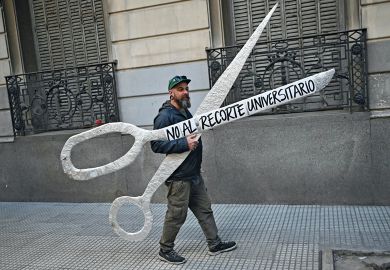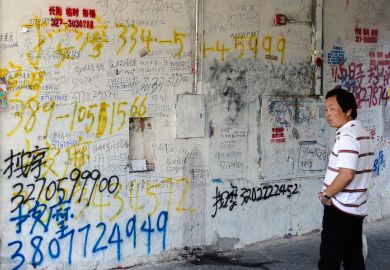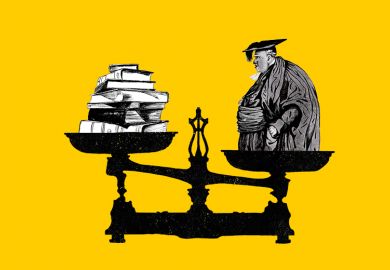To say that the past year has not been easy for academics in Argentina would be something of an understatement. Since the electoral triumph of the far-right coalition La Libertad Avanza, our work has been systematically attacked.
It is not only internet trolls who disseminate hate speech against the very fabric of Argentine science and higher education: the president himself, Javier Milei – who came to power exactly one year ago today – has openly attacked these pillars of democratic life. At a gathering of far-right thinkers and businessmen in Buenos Aires, for instance, he declared that scientists and professors belonged to an imaginary malign sector of the population that he and his followers call “the caste”.
The precise make-up of the “caste” is elusive. At first, it was “the political caste”: former and current politicians, union leaders and activists who were supposedly to blame for the series of economic crises Argentina has gone through. But the membership keeps getting broader: now even humble scholars such as myself, who barely make ends meet, are part of this diabolical structure intentionally impoverishing our country.
Wages for researchers employed by the National Scientific and Technical Research Council (Conicet), the national funding agency, are just above the poverty line, but in his speech, Milei railed against “the so-called scientists and intellectuals, who believe that having an academic degree makes them superior and [that] therefore we should all subsidise their vocation” (my translation).
“If they think their research is so useful, I ask them to go out into the market (like the guy next door): do research, publish a book and see if people are interested or not, instead of despicably hiding behind the coercive force of the state.”
For those of us committed to a research agenda grounded in gender studies and an inclusive society (my research is on female artists), Milei added insult to injury at this year’s annual meeting of the World Economic Forum, where he declared that feminism was a “ridiculous and unnatural fight between man and woman” caused by socialism, adding that abortion rights were a “tragedy”.
I am aware that I am not being overly original in my telling of these events. Others have described in devastating detail Milei’s clear intention of dismantling key institutions in Argentina’s science and higher education system. But I want to share some almost intimate thoughts on this tragic moment, which will highlight how peculiar and tragic the situation is.
Unless you come from money, being a researcher in Argentina is a bad idea and will eventually land you in debt. I do not come from money: I – like many colleagues whose research is not deemed economically significant by the current administration – was able to pursue a PhD thanks to the investments in science made by the administrations that governed Argentina between 2003 and 2015.
After completing my PhD, I received the equivalent of tenure and was able to dream about becoming part of the middle class: in the country I became an adult in, a researcher could come from a non-privileged background. But our new reality threatens all that: only a few privileged scholars, those who do not rely on their salary to make a living, can aspire to secure tenure now.
In February, a few things in my house needed to be fixed, and I was also diagnosed with fibromyalgia, for which I needed medication that resulted in a substantial increase in my monthly expenses. Those outgoings were already larger than the average 40-year-old’s because I had cancer in 2009 and continue to need to purchase medication for that, too. So what could I do? I had a wild idea: using my Instagram account, I sold about 100 books from what had been my pride and joy: my personal library. I cross-checked with my university library and put on sale those books that I know I can request there.
Is this the new normal? Here’s another example. In July, after many years of dutifully serving me and hundreds of students, my computer was officially done. I needed a new one, and as my employer has no money for such things, I had to buy it myself. So I came up with another plan – but it was even worse than selling my books. I asked my bank for a loan.
That is, I went into debt in order to do my job of researching and teaching. You do not become an academic for the money and fame, that is for sure, but getting into actual debt was unexpected.
As the year comes to an end, I look back and reflect on how hard it has been. And I am terrified for the future. How are scholars who do not come from money and who do not have savings supposed to even survive? How are we even surviving now?
I grin. At least I do not have children to support, like many of my colleagues do. I do, however, have a new debt for something my employer should have helped me with in the first place. And who knows what I will do the next time I am hit by an unexpected expense?
If I am part of a caste, it feels like the lowest one.
The author is an academic in Argentina.
Register to continue
Why register?
- Registration is free and only takes a moment
- Once registered, you can read 3 articles a month
- Sign up for our newsletter
Subscribe
Or subscribe for unlimited access to:
- Unlimited access to news, views, insights & reviews
- Digital editions
- Digital access to THE’s university and college rankings analysis
Already registered or a current subscriber?








